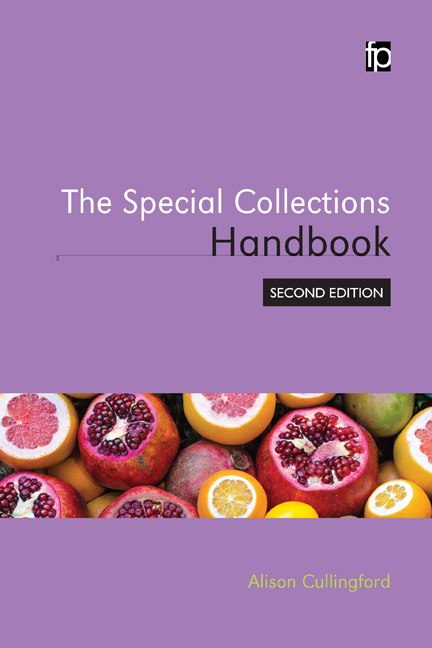Book contents
- Frontmatter
- Contents
- Preface and acknowledgements
- Introduction
- 1 The care of Special Collections
- 2 Emergency planning for Special Collections
- 3 Understanding objects in Special Collections
- 4 Acquiring and developing Special Collections
- 5 Cataloguing, description and metadata in Special Collections
- 6 Digitization and digital libraries in Special Collections
- 7 Legal and ethical issues in Special Collections
- 8 User services in Special Collections
- 9 Marketing and communications in Special Collections
- 10 Widening access to Special Collections
- 11 Organizational resources for Special Collections: space and people
- 12 Influencing and fund-raising for Special Collections
- Afterword: Special Collections futures
- Appendix A The Special Collections reference shelf
- Appendix B Skills for your Special Collections career
- Bibliography
- Index
7 - Legal and ethical issues in Special Collections
- Frontmatter
- Contents
- Preface and acknowledgements
- Introduction
- 1 The care of Special Collections
- 2 Emergency planning for Special Collections
- 3 Understanding objects in Special Collections
- 4 Acquiring and developing Special Collections
- 5 Cataloguing, description and metadata in Special Collections
- 6 Digitization and digital libraries in Special Collections
- 7 Legal and ethical issues in Special Collections
- 8 User services in Special Collections
- 9 Marketing and communications in Special Collections
- 10 Widening access to Special Collections
- 11 Organizational resources for Special Collections: space and people
- 12 Influencing and fund-raising for Special Collections
- Afterword: Special Collections futures
- Appendix A The Special Collections reference shelf
- Appendix B Skills for your Special Collections career
- Bibliography
- Index
Summary
Introduction
This chapter will cover:
Basics of legal and ethical issues in Special Collections.
Intellectual property, particularly copyright.
Data protection and freedom of information.
Cultural property.
Personal integrity.
Ethics in fund-raising.
Equality, health and safety, and working with children.
Coping with legal and ethical matters is one of the most important and difficult aspects of managing Special Collections. These matters are important because they crop up throughout Special Collections work and, if not managed properly, can have serious consequences for the organization. ‘Furthermore, Special Collections librarians have extraordinary responsibilities and opportunities associated with the care of cultural property, the preservation of original artifacts, and the support of scholarship based on primary research materials’ (Association of College & Research Libraries, 2003).
The following factors make legal and ethical issues difficult to manage:
Complex legal situations (especially, as we will see, copyright law). It can be hard to be sure whether an action is legal or not. Legislation is frequently amended, and understanding of the law is further refined via interpretations in court decisions.
Grey areas: often there is no ‘right’ answer and a balance between conflicting values has to be found. ‘When values come into conflict, librarians must bring their experience and judgment to bear on each case in order to arrive at the best solution, always bearing in mind that the constituency for special collections includes future generations’ (Association of College & Research Libraries, 2003).
How can librarians cope with these challenges? By understanding the law, building effective policies and practices, and collaborating with others in and outside their sector.
This chapter covers the elements of law most commonly met with in Special Collections practice and for which the management is generally devolved to the library. I have not attempted to cover the complexities of contract law, beyond the areas of donation and deposit, already discussed in Chapter 4. Librarians generally engage with this element as part of large capital projects such as digital libraries or new buildings, and their institutions should be seeking qualified legal advice as part of the process.
- Type
- Chapter
- Information
- The Special Collections Handbook , pp. 127 - 146Publisher: FacetPrint publication year: 2016
- 1
- Cited by



